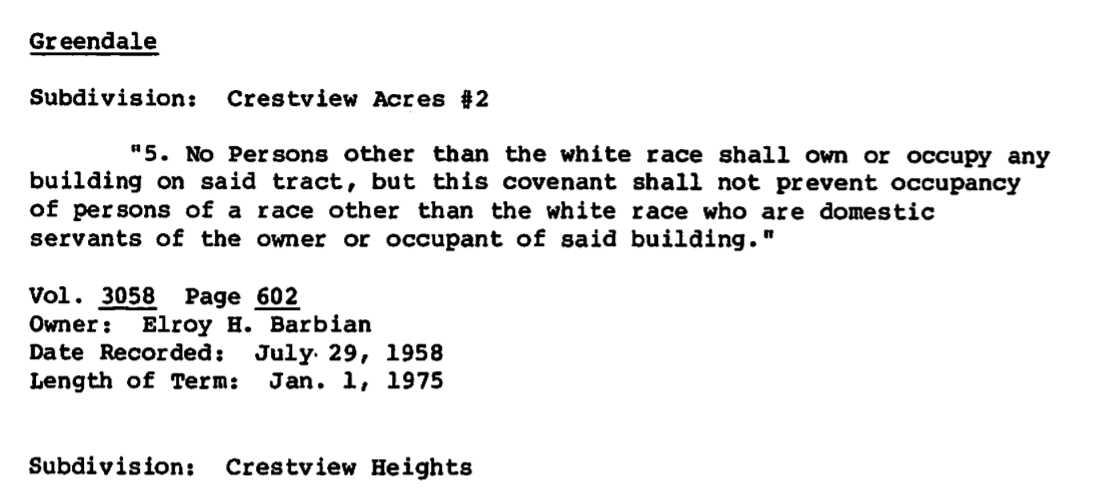Discriminatory Covenants and Deed Restrictions in Wisconsin
LEGISLATION
2023 Wisconsin Act 210
Relating to: declaring discriminatory restrictions in instruments that affect real property void and unenforceable and allowing an owner of real property to discharge and release such a discriminatory restriction.
Wisconsin Legislative Council Act Memo: 2023 Act 210
MEMOS SUPPORTING LEGISLATION
Offensive, discriminatory covenants based on race and other protected classes appear in deeds and subdivision restrictions and covenants throughout Wisconsin. While illegal, this language haunts the title records and title commitment reports received by buyers looking to purchase these properties.
Background



The 1968 Fair Housing Act and Wisconsin’s Open Housing Law prohibit these covenants but does not erase discriminatory restrictions from property deeds and title records. Seeing the language stuns and offends potential buyers turning the home buying process which is already fraught with emotion.
The Proposal
- Reiterates Wisconsin law prohibits discriminatory restrictions
- Allows a property owner to record a statutory form with the register of deeds to discharge and release the restriction from the title
- Requires the statutory form to be provided by the state
- Compels the register of deeds to accept the statutory form if: the form is notarized; contains a legal description; contains the date of the recording of the instrument containing the restriction along with the volume and page number; and complies with other recording requirements
This legislation is intended to empower the property owner to take action when a discriminatory restriction is recorded on their land record.
History of Discriminatory Covenants
1917, the U.S. Supreme Court ruled ordinances establishing racial restrictions violated the Fourteenth Amendment. However, discriminatory restrictive covenants continued to superseded ordinances and became a mechanism for establishing segregation. (Buchanan v. Warley, 245 U.S. 60 (1917))
1926, the U.S. Supreme Court affirmed the legality of the practice of developers writing racially restrictive covenants into the title of millions of new homes. The ruling in stated private deeds and developer plat maps are not similarly affected by the Fourteenth Amendment like states because individuals enter into covenant agreements voluntarily, whereas ordinances are imposed by state and municipal government. (Corrigan v. Buckley, 271 U.S. 323 (1926))
1942, the Wisconsin Supreme Court held that a black man was prohibited from building a cabin with a value of less than $600 on a Wisconsin lake, although whites could do so under the racially restrictive covenants governing this lakefront property. (Doherty v. Rice, 3 N.W.2d 734 (Wis. 1942))
1948, the U.S. Supreme Court unanimously ruled racially restrictive covenants were unenforceable. the court held judicial enforcement of racially restrictive covenants was unconstitutional. (Shelley v. Kraemer, 334 U.S. 1 (1948))
Articles
Lawmakers weigh in as Wauwatosa asks state to undo racial covenants
The fate of decades-old racially restrictive housing covenants in parts of Wisconsin is now up to the state. Earlier this month, the city of Wauwatosa’s common council unanimously voted to move towards dissolving the restrictions against selling properties to nonwhites or non-Christians that still remain on some property deeds.
Racial restrictions still exist in Wisconsin property deeds. Wauwatosa is pushing the state to remove them
In some Wauwatosa property deeds, homeowners can still find restrictions that ban anyone who is not white from living there. The city’s equity and inclusion commission is asking for statewide legislation to remove this racist language that, experts say, has had far-reaching detrimental effects.


